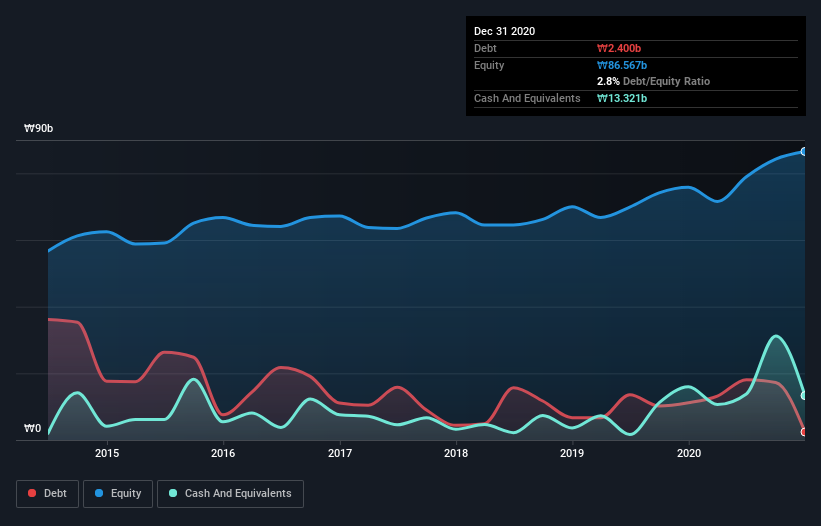- South Korea
- /
- Consumer Durables
- /
- KOSDAQ:A037070
These 4 Measures Indicate That Paseco (KOSDAQ:037070) Is Using Debt Safely
Howard Marks put it nicely when he said that, rather than worrying about share price volatility, 'The possibility of permanent loss is the risk I worry about... and every practical investor I know worries about.' When we think about how risky a company is, we always like to look at its use of debt, since debt overload can lead to ruin. As with many other companies Paseco Co. Ltd (KOSDAQ:037070) makes use of debt. But the real question is whether this debt is making the company risky.
Why Does Debt Bring Risk?
Debt is a tool to help businesses grow, but if a business is incapable of paying off its lenders, then it exists at their mercy. Part and parcel of capitalism is the process of 'creative destruction' where failed businesses are mercilessly liquidated by their bankers. However, a more frequent (but still costly) occurrence is where a company must issue shares at bargain-basement prices, permanently diluting shareholders, just to shore up its balance sheet. Of course, the upside of debt is that it often represents cheap capital, especially when it replaces dilution in a company with the ability to reinvest at high rates of return. When we think about a company's use of debt, we first look at cash and debt together.
Check out our latest analysis for Paseco
What Is Paseco's Debt?
As you can see below, Paseco had ₩2.38b of debt at December 2020, down from ₩11.2b a year prior. But on the other hand it also has ₩13.3b in cash, leading to a ₩10.9b net cash position.

A Look At Paseco's Liabilities
We can see from the most recent balance sheet that Paseco had liabilities of ₩23.5b falling due within a year, and liabilities of ₩5.22b due beyond that. On the other hand, it had cash of ₩13.3b and ₩12.6b worth of receivables due within a year. So its liabilities total ₩2.76b more than the combination of its cash and short-term receivables.
This state of affairs indicates that Paseco's balance sheet looks quite solid, as its total liabilities are just about equal to its liquid assets. So while it's hard to imagine that the ₩305.8b company is struggling for cash, we still think it's worth monitoring its balance sheet. While it does have liabilities worth noting, Paseco also has more cash than debt, so we're pretty confident it can manage its debt safely.
On top of that, Paseco grew its EBIT by 57% over the last twelve months, and that growth will make it easier to handle its debt. When analysing debt levels, the balance sheet is the obvious place to start. But you can't view debt in total isolation; since Paseco will need earnings to service that debt. So when considering debt, it's definitely worth looking at the earnings trend. Click here for an interactive snapshot.
Finally, a company can only pay off debt with cold hard cash, not accounting profits. Paseco may have net cash on the balance sheet, but it is still interesting to look at how well the business converts its earnings before interest and tax (EBIT) to free cash flow, because that will influence both its need for, and its capacity to manage debt. Over the most recent three years, Paseco recorded free cash flow worth 74% of its EBIT, which is around normal, given free cash flow excludes interest and tax. This free cash flow puts the company in a good position to pay down debt, when appropriate.
Summing up
While it is always sensible to look at a company's total liabilities, it is very reassuring that Paseco has ₩10.9b in net cash. And it impressed us with its EBIT growth of 57% over the last year. So we don't think Paseco's use of debt is risky. When analysing debt levels, the balance sheet is the obvious place to start. However, not all investment risk resides within the balance sheet - far from it. For example - Paseco has 1 warning sign we think you should be aware of.
When all is said and done, sometimes its easier to focus on companies that don't even need debt. Readers can access a list of growth stocks with zero net debt 100% free, right now.
If you’re looking to trade a wide range of investments, open an account with the lowest-cost* platform trusted by professionals, Interactive Brokers. Their clients from over 200 countries and territories trade stocks, options, futures, forex, bonds and funds worldwide from a single integrated account. Promoted
New: Manage All Your Stock Portfolios in One Place
We've created the ultimate portfolio companion for stock investors, and it's free.
• Connect an unlimited number of Portfolios and see your total in one currency
• Be alerted to new Warning Signs or Risks via email or mobile
• Track the Fair Value of your stocks
This article by Simply Wall St is general in nature. It does not constitute a recommendation to buy or sell any stock, and does not take account of your objectives, or your financial situation. We aim to bring you long-term focused analysis driven by fundamental data. Note that our analysis may not factor in the latest price-sensitive company announcements or qualitative material. Simply Wall St has no position in any stocks mentioned.
*Interactive Brokers Rated Lowest Cost Broker by StockBrokers.com Annual Online Review 2020
Have feedback on this article? Concerned about the content? Get in touch with us directly. Alternatively, email editorial-team (at) simplywallst.com.
About KOSDAQ:A037070
Paseco
Manufactures and sells water appliances, heaters, and commercial and home appliances primarily in Korea.
Excellent balance sheet with low risk.
Market Insights
Community Narratives



